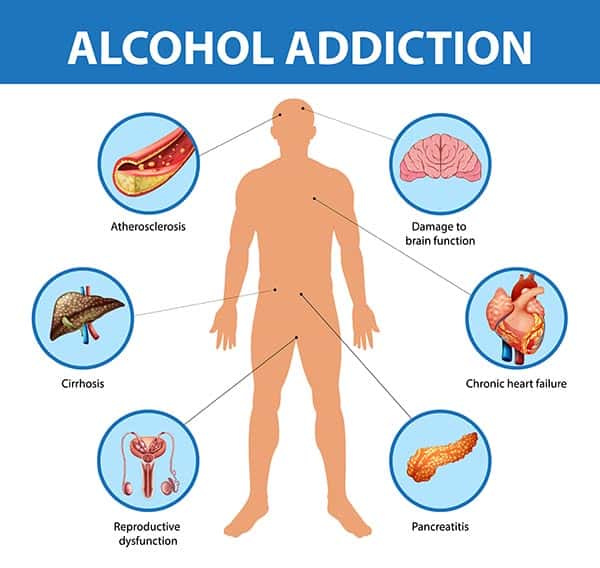Addiction Myths & Facts
10 Facts About Alcohol Dependence
10 Facts About Alcohol Dependence
Alcohol addiction is not as straightforward as other chronic health conditions. Not only does alcohol addiction affect all areas of a person’s life, but the complexity of treatment options makes recovery a little more complicated. Whereas a person with diabetes can simply take insulin and make slight lifestyle changes, a person who has been struggling with addiction must commit to an entirely new way of life. This prospect might seem daunting at first. Change can be scary — even positive change. At CuraWest we want to make sure you and your loved ones are equipped with the facts. We have compiled a list of 10 facts about alcohol addiction to help you better understand the ins and outs of the chronic health condition, and to know what to expect from the treatment process. If you have any additional questions you are more than welcome to reach out to us at any point in time.
Fact #1: Alcohol Addiction is Not a Choice.
There has been an ongoing debate between whether addiction is a choice or a chronic health condition; one that develops over time and can be effectively treated, but never entirely cured. Despite innumerable research studies which provide ample evidence supporting the claim addiction is a neurological disorder, some people still cling to the misguided belief that it boils down to a matter of weak will-power or a lack of morals. When it comes to the development of alcohol addiction there are certain risk factors which make certain people more susceptible. If a person has one or several of these risk factors and they use alcohol consistently over a prolonged period of time, alcohol use will eventually become compulsive. They lose all control over their alcohol use. While alcohol addiction is not a choice, picking up alcohol for the very first time is — which is why those with multiple risk factors benefit immensely from complete abstinence.
Fact #2: Alcohol Addiction Has a Genetic Component.
Genetic predisposition is one of the most predominant risk factors when it comes to the development of alcohol addiction. If one of your immediate family members has struggled with addiction, you are more likely to misuse chemical substances. According to an article published by the U.S. National Library of Medicine, “Alcohol dependence (alcoholism), the most severe alcohol use disorder, is a complex genetic disease. Alcoholism has long been noted to run in families, but that alone is not sufficient to demonstrate that genetic factors contribute to risk. Many independent lines of evidence point to genetic contributions to its etiology.” This is only one of countless scientific research studies conducted on the subject.
We Are Here For You
Let Us Help You Heal
Our Alcohol detoxification experience is second to none.
Learn how we can help by speaking with one of our Treatment Advisors today.
Fact #3: Alcohol Addiction Can Happened to Anyone.
While genetic predisposition and other risk factors often play a role in the development of alcohol dependence, alcohol addiction can happen to anyone. Addiction can affect any person regardless of their personal background, age, gender, demographic, occupation or beliefs. Alcohol addiction can either develop quickly or over time; it affects everyone differently. Some people drink socially and without incident for years, and begin developing a physical dependence on alcohol later on in life. Others begin drinking alcoholically from an early age, during early adolescence or young adulthood. Still others turn to alcohol as a way to cope with a traumatic event or an adverse life experience. Once you commit to a program of alcohol addiction recovery the root causes of your addiction will be explored more in depth. The first step is reaching out for help as soon as help becomes necessary.
Our Alcohol Detox Services Include
Fact #4: Alcohol Addiction Can be Fatal.
Some people who are struggling with alcohol addiction say things like, “I might drink a little too much, but I’m not ready to seek help yet.” Or, “It’s not like my drinking is going to cause me any real harm.” The truth is, prolonged alcohol misuse can cause severe and permanent damage to the body. People who drink heavily have a higher risk of developing the following health concerns, according to the Centers for Disease Control and Prevention: high blood pressure, heart disease, liver disease, permanent brain damage, stroke, certain types of cancer and digestive problems. Some of these complications can be fatal if alcohol addiction is left untreated.

Fact #5: Alcohol Addiction is Progressive.
Alcohol use disorders are progressive, meaning when left untreated associated symptoms continue to worsen in severity. If a person who is struggling with alcohol addiction refuses help, the consequences of the addiction will continue accumulating until they are unmanageable. This is why it’s a good idea to enter into a recovery program as soon as you experience symptoms of addiction. For example, an inability to control how much you drink, cravings for alcohol, an increased tolerance and personal consequences resulting directly from your alcohol use. The sooner you catch an alcohol use disorder the more likely you are to recover in full.
Fact #6: Attempting Alcohol Detox Alone is Dangerous.
Some people attempt to detox from alcohol on their own, assuming the worst symptoms they will experience are a little bit of anxiety and stomach cramping. The truth is, alcohol withdrawal can be extremely dangerous when attempted alone — regardless of the severity of the alcohol use disorder. At Pine Tree Recovery Center we effectively treat all symptoms associated with alcohol withdrawal — physical and psychological — as soon as they develop.
Fact #7: People Can Hide an Alcohol Addiction.
If a person is unfamiliar with what alcohol addiction looks like, they might assume someone struggling with alcohol addiction looks disheveled and red-eyed and constantly reeks of booze. The truth is, some people (the functioning alcohol-dependent) can easily hide their drinking and carry on with their day-to-day lives. They might successfully hide their drinking from others for months or even years. Because of this, it is important for you to be honest with yourself if you feel your drinking is getting out of hand.
Fact #8: Not All People Struggling with Alcohol Addiction Drink Every Day.
When it comes to alcohol addiction, people tend to fall somewhere on a spectrum. At one end of this spectrum are the hard alcoholics, who wake up in the morning and pour themselves a pint of vodka to avoid withdrawal and get the day started. On the other end of this spectrum are the highly functional alcohol-dependent, who wait until 9 p.m. to start drinking so their habits don’t interfere with their personal responsibilities. Alcohol addiction looks entirely different for different people.

Ready To Begin Your Alcohol Detox?
We Offer A Safe & Effective Program
Don’t let Alcohol addiction control your life.
Call us today and let’s get you started on the path to a better you.
Fact #9: Alcohol Addiction is Treatable.
The good news is, alcohol addiction is a treatable condition. This is the case regardless of how severe an alcohol use disorder has become and how many consequences you have been dealing with. The type of treatment required depends heavily on your personal circumstances, however. If you have a severe alcohol use disorder and an underlying mental illness, a multi-phased continuum of care is likely the best option. This continuum might begin with medical detox, progress to residential inpatient treatment and conclude with sober living and intensive outpatient treatment. If a person has been struggling with alcohol misuse for several months, an IOP might serve as a viable standalone solution. We are more than happy to help you determine the best course of action for your unique case.
Fact #10: Attending Treatment Greatly Improves Chances of Treating Alcohol Addiction.
If you fail to attend treatment of any kind, you will have a significantly reduced chance of maintaining sobriety. Remember — any form of addiction treatment is better than no treatment at all. People who commit to a longer term care tend to have more positive treatment outcomes. At Pine Tree Recovery Center we always recommend medical detox as a necessary first step, and we offer rehab placement services to clients looking to continue the recovery process with a higher level of care.
Begin Healing Now!
Have A Call With One Of Our Treatment Advisors
Don’t Suffer Any Longer
Our Simple Admissions Process
At CuraWest we offer a comprehensive alcohol detox program in Denver, Colorado. Because alcoholism is a chronic condition, symptoms only continue to worsen the longer they are left untreated. In most cases medical detox is an important first step on a multi-phased journey of recovery. In addition to providing our clients with a safe and comfortable alcohol withdrawal we offer a range of addiction services geared towards a smooth transition into the next appropriate level of clinical care. Each of our clients is assigned a case manager who works directly with the clinical team to develop a personalized aftercare plan. We understand how difficult it can be to come to terms with an alcohol abuse disorder and reach out for help, especially when you aren’t sure what to expect. Rest assured from the moment you make initial content we will be available to walk you through every step of the process from start to finish. We have developed an admissions process that is simple, straightforward and can be completed in a short matter or minutes. Contact us directly through our website or call us today to learn more.

Reviewed for accuracy by:
Jasmine Billups
LPC-S
Jasmine has worked in the mental health field for over 18 years. She earned her B.A. in Psychology with a Minor in Child and Family Relations from North Carolina Central University, and her M.A. in Mental Health Counseling from Argosy University. Jasmine is a Licensed Professional Counselor Supervisor and has specialized in addiction for over 10 years.























